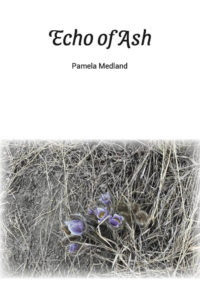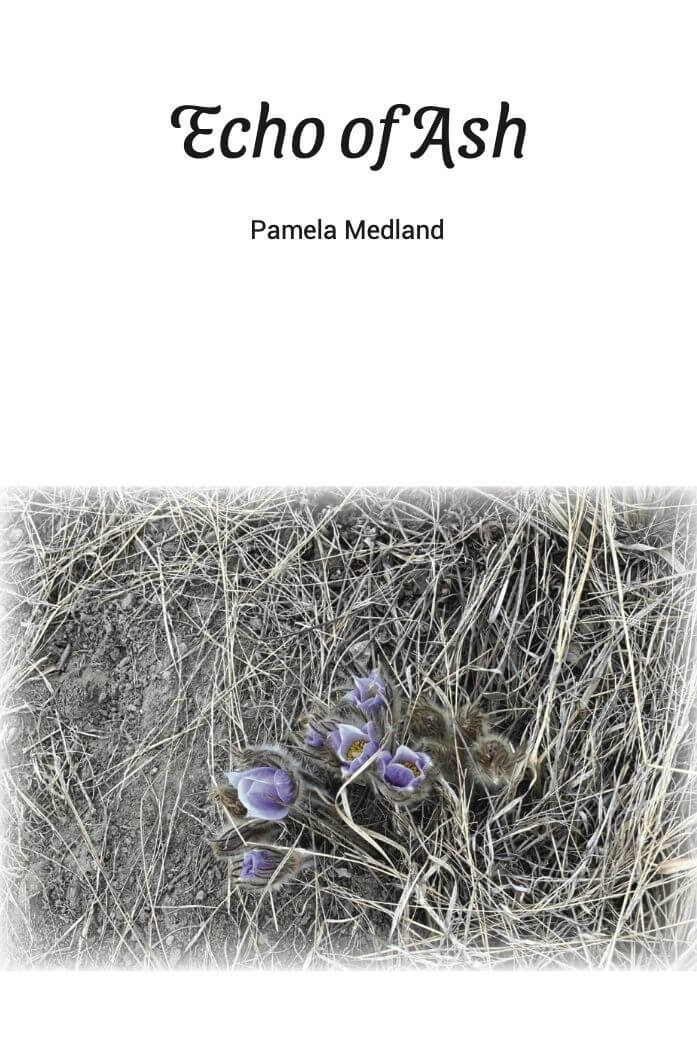By Carla Scarano
Echo of Ash
by Pamela Medland
Passwords Enterprises
ISBN 9780968091860
Echo of Ash is an engaging first full collection that displays a journey through bereavement after the unexpected and sudden death of Medland’s husband, Murray. She travels from total grief to ‘surfacing’ and then ‘survival’, an acceptance of sorts and an acknowledgement of the inevitable emptiness she is left with. The poems intensely describe the stages Medland goes through, evoking memories of their life seen from a present perspective. The wish to be together again, to meet again, is urgent and strong but impossible to attain.
Intimate feelings are disclosed and unravel in vivid impressive imageries; their freshness and honesty surprise the reader and reveal an emotional inner richness:
You lie on the bed hard and cold;
we’re waiting for the medical examiner,
this sudden gulf between us inexplicable.
(‘The River Styx’)
I breathe the stench of death,
comb the grief through my hair.
(‘Untouchable’)
Now I fight through a river of grief.
Black and still,
flooding through my days and nights,
a cold promise of nothing.
(‘Off the Capilano Train Trestle’)
In her debut chapbook (Bright Blade, 2020), Medland outlined a journey that delineated her progress towards survival against the odds. Family relationships were in the foreground; her mother and her grandmother were described as important role models in the poet’s life. They are her landmarks but also figures to distance herself from in order to develop her strength and a personal identity. As in her full collection, her voice was already strong, confident and sharp, with an increasing self-awareness. Courage and determination projected the protagonist in a continuous search and eventually into a hopeful perception of her world and of her future. Both in Bright Blade and in this collection, the journey of the poet shows contradictions, sorrow, sharp bends and sudden revelations on a route towards self-awareness and self-definition that is always engaging and captivating.
In Echo of Ash, the structure of the poems and the themes are more consistent and evolve in multiple images. The grief is presented and explored thoroughly and from different sides, revealing progress that is never-ending in her search for her husband but also in her pursuit of her own identity after the bereavement that left a profound void. The approach is sincere and mature; it is physical at times, such as when she eats his ashes or wears his underwear. Time passes, the gap narrows and sorrow still lingers behind everyday ‘normality’. Family and friends suggest it is time ‘to move on’, that is, acknowledge the loss but also give in to the inevitable absence of her husband, to his death. However, this does not seem to be Medland’s final goal. She wishes to preserve her memories of him, keeping her presence close to him in some kind of vision:
Sipping a scotch,
I see you walking, like Christ,
on Honeymoon Bay.
Yellow iris, scarlet wing,
your shroud out of place
in late evening sun.
(‘Summer Vision’)
Remembering him and looking for him become a quest; this search is a ‘river without end’, ‘a slippery path’ where ‘rocks once hidden/radiate’. Moments of healing alternate with desperation in ‘a quiet, endless becoming’ that eventually brings acceptance despite the poet still feeling lonely and ‘insufficient’. Poetry is the place where Medland discovers the effects of death in her life and in herself. She searches for her husband in the places they visited together, in a silent conversation, attempting different paths and trying to make sense of the meaning of death, and she remembers that they traced ‘a map of possibility’ in a land where they belonged, where they met and grew in harmony. Thus, the exploration shifts between past and present and goes beyond the ending, promising a different view. However, death exists; it is a constant presence even though we don’t think about it in everyday life, and this affects her state of mind. In this personal journey in grief, which takes the shape of a universal journey, renewal is finally reflected in nature:
Studying my palm now
I see the break,
a sudden cross-hatching:
crow’s feet marching
in opposite directions.
Every lunar cycle
my palm regenerates.
Lines reform round the curl
of my fingers, a cup
for the moon.
(‘Regeneration’)
The final poem denotes absence in presence, an oxymoron that highlights unresolved contradictions where life and death cannot be conciliated but coexist in ‘the beauty of nothing’. It is a touching ending that ‘moves us to silence’; it starts the long journey towards healing and opens up new and different possibilities in a never-ending process of reconciliation and growth.

